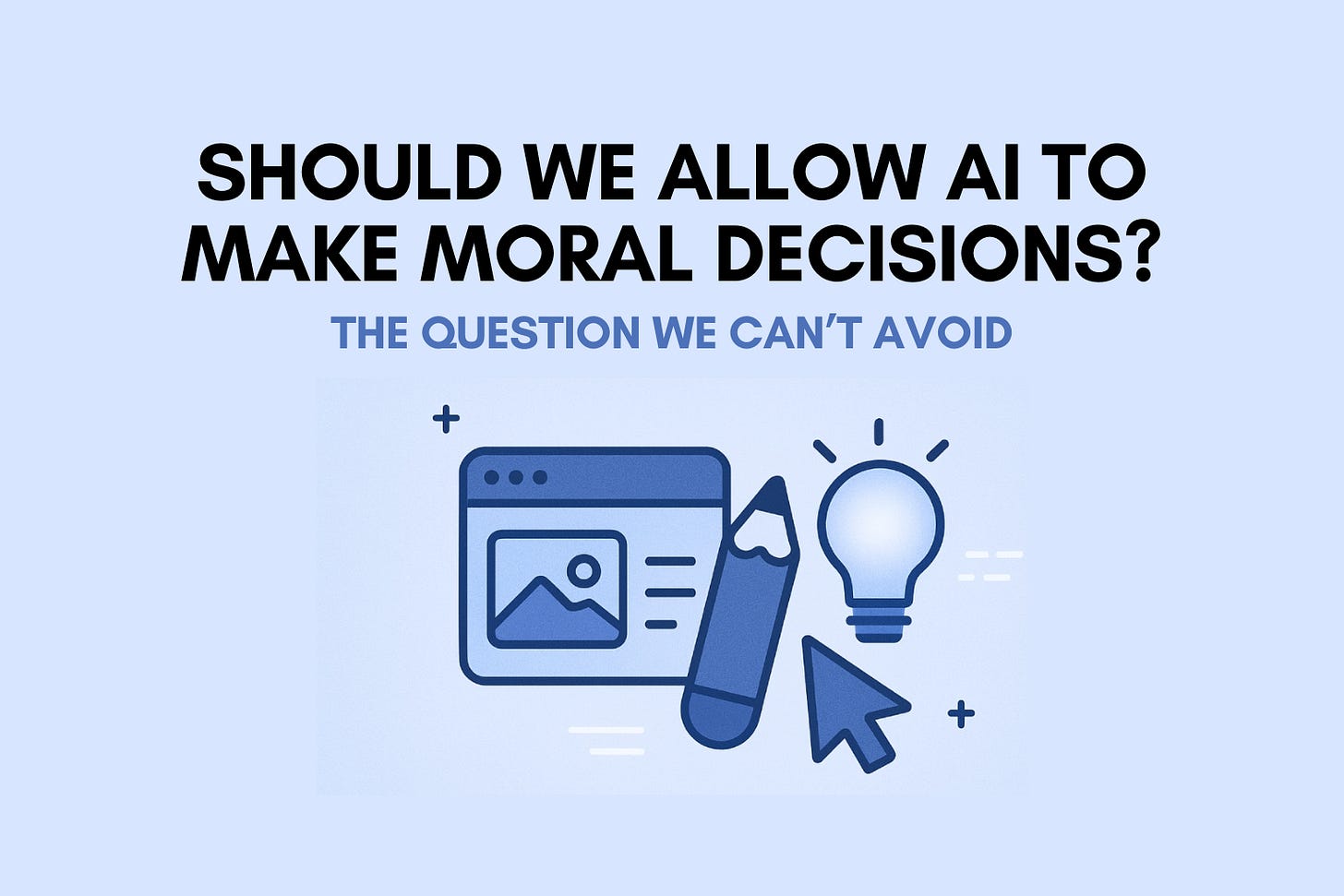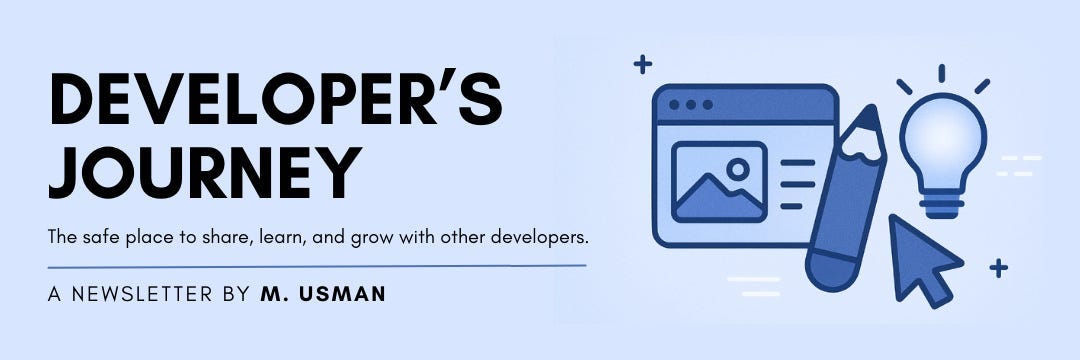If a self-driving car has to choose between saving one person or saving five, who should make that call?
The engineer who built it?
The passenger inside it?
Or the AI itself?
That’s not a sci-fi movie plot. That’s a real question engineers, ethicists, and lawmakers are already wrestling with.
This isn’t science fiction anymore. These are real questions. AI isn’t just predicting what ad you’ll click on. It’s starting to make decisions in medicine, law, hiring, and even war, yes I said it, even war. AI isn’t just about recommending the next song on Spotify or predicting your shopping habits anymore. It’s stepping into areas that touch life and death, justice and fairness, freedom and responsibility.
Here’s the uncomfortable truth, whether we like it or not, machines are stepping into the moral area as well.
And that leaves us with one big question: Should we let AI make moral decisions?
Why This Question Matters Right Now
When people talk about AI, they often imagine futuristic robots, flying cars, or dystopian scenarios. But the reality is far closer, and far messier. AI is already making decisions that carry serious moral weight.
Healthcare: Hospitals use AI to help decide which patients should get treatment first when resources are limited.
Law: Some courts use AI tools to recommend bail amounts or predict whether someone is likely to re-offend. (Multiple U.S. jurisdictions have implemented tools like PSA and COMPAS to assist judicial decisions around bail, parole, and sentencing.)
Jobs: Companies use AI to screen applications and filter out candidates before a human even looks at them.
Warfare: Militaries are testing autonomous drones that can identify and strike targets without human approval.
That’s not tomorrow’s problem, that’s a today’s absolute reality.
And every single one of these examples has moral consequences. Who gets help first. Who gets a second chance, who gets hired, who lives, and who dies.
So we can’t dodge this anymore. We need to decide what role AI should play in moral decision-making.
The Case for Letting AI Decide
Let’s start with the optimistic argument. Some believe AI might actually be better than humans at making certain moral calls.
1. Speed and Scale
AI can process massive amounts of data in seconds. Things that would take us weeks, months, or even years.
In medicine, for instance, AI can scan thousands of medical records, lab results, and X-rays to prioritize patients with the best survival odds. In disaster zones, AI can crunch satellite images, social media posts, and sensor data to figure out which areas need urgent help.
And in situations where every second matters, that speed can save lives.
2. Less Emotional Bias
Humans are emotional and unpredictable. We carry bias, anger, fear, favoritism, and sometimes prejudice.
AI doesn’t get jealous. It doesn’t care about social status or personal grudges. It doesn’t let ego cloud its judgment.
If a human judge is in a bad mood, the sentence might be harsher. An AI judge wouldn’t care if it skipped breakfast or fought with its partner that morning.
That kind of consistency sounds appealing.
3. Consistency and Rule Following
Humans are inconsistent. Two doctors in the same hospital might make totally different decisions. Two judges in similar cases might give different sentences.
AI, on the other hand, follows the same logic every time. Once programmed, it won’t suddenly change its mind halfway through.
Consistency doesn’t always mean fairness, but it does mean predictability.
Example: A Pandemic Scenario
Imagine a hospital overwhelmed during a pandemic. There are only a limited number of ventilators.
Doctors are stressed, tired, and forced to make impossible choices. Who gets the machine, and who doesn’t?
An AI system could analyze patients’ data age, medical history, likelihood of survival, and make those decisions quickly.
Cold? Yes. But possibly effective.
This is the case for AI faster, more consistent, less emotional.
The Case Against Letting AI Decide
Now let’s flip the coin. Because the optimistic picture leaves out some big problems.
1. Built-in Bias
AI isn’t neutral. It learns from data, and that data comes from us.
If hiring data over the last 20 years shows a preference for men over women, guess what the AI learns? That men are “better candidates.”
If law enforcement data reflects racial bias, the AI will echo that bias.
We say AI is objective, but really, it’s just a mirror. A mirror that reflects, and amplifies our flaws.
2. No Accountability
If a doctor makes a bad call, you can question them. If a judge makes a mistake, they can be held accountable.
But if an AI makes the wrong moral decision, who do we blame?
The engineer who coded it?
The company that deployed it?
The AI itself?
Right now, there’s no clear answer. And without accountability, it’s dangerous to let machines make life-and-death calls.
3. Lack of Empathy
Morality isn’t just about logic. It’s about compassion. About feeling the weight of a decision.
An AI might calculate that sacrificing one person to save five is the rational choice. But it can’t feel the grief of the family who loses that one person.
Machines can simulate reasoning. But they can’t simulate feeling. And without empathy, morality becomes mechanical.
Example: Wrongful Arrests
Facial recognition systems have misidentified people of color, leading to wrongful arrests.
The AI didn’t intend harm. It just made a calculation. But harm was done anyway.
That’s the risk. AI doesn’t understand consequences the way we do.
The Gray Zone (Where It Gets Messy)
Some moral decisions seem straightforward in theory but collapse in practice.
Take the classic “trolley problem”:
A train is speeding toward five people. You can pull a lever to redirect it, but then it will hit one person.
Western ethics often lean toward saving the five. But in some cultures, taking direct action that causes harm even if it saves more lives is viewed as morally wrong.
So whose ethics should the AI follow?
And what about the fact that morality evolves?
Fifty years ago, society’s moral standards were different. Slavery, segregation, discrimination, things that were once considered “normal” are now unthinkable.
If AI is trained on today’s data, will it carry today’s biases into tomorrow? Will it freeze morality instead of letting it evolve?
This is the gray zone. The messy part of morality that can’t be neatly coded into algorithms.
Real-World Scenarios That Push the Limits
To see how complex this gets, let’s look at some real and hypothetical scenarios.
1. Self-Driving Cars
If a self-driving car has to choose between hitting a pedestrian or swerving and risking the passengers’ lives, what should it do?
Should the car prioritize its passengers because they “trusted” it? Or should it prioritize the pedestrian because they didn’t consent to the risk?
Different people will answer differently. So how should the AI decide?
2. Healthcare
Just imagine an AI deciding who gets an organ transplant.
Should it prioritize the youngest patient? The one with the best chance of long-term survival? The one with dependents?
Humans struggle with these questions already. Handing them to AI doesn’t make them easier.
3. Autonomous Weapons
This one is chilling. Militaries are developing AI-powered drones that can identify and strike targets without human input.
Who decides what counts as a legitimate target? And if the AI makes a mistake, if it kills civilians instead of combatants, who takes responsibility?
These aren’t abstract thought experiments. They’re real dilemmas being debated right now.
What This Means for Us
Here’s the truth, AI will face moral decisions whether we allow it or not.
The question isn’t whether it should make them. It’s whether it should make them alone.
That’s where the idea of “human-in-the-loop” comes in.
AI can gather data, analyze patterns, and give recommendations.
But a human makes the final call.
Think of AI like a GPS. It can suggest the fastest route, warn you about traffic, and even reroute you. But you’re still behind the wheel.
If the GPS says “turn left” and you see a lake, you can ignore it.
That’s the balance we need. AI as an advisor. Not a decider.
A Quick Look at Philosophy
To dig deeper, let’s connect this with ethics.
Utilitarianism says we should maximize overall happiness. An AI could calculate who benefits most from a choice.
Deontology says some actions are right or wrong regardless of outcomes. An AI might struggle with this, since it loves numbers.
Virtue ethics says morality depends on character and intentions. But AI doesn’t have intentions it only has algorithms.
This is why moral philosophy and AI don’t always mix neatly. Morality isn’t just about outcomes. It’s about context, intent, and responsibility.
My Take
Here’s where I land on this.
AI should never have the final word on morality.
Advice? Yes.
Second opinions? Absolutely.
Calculations and probabilities? Perfect.
But the final decision? That has to stay human.
Why? Because morality is more than logic. It’s empathy. Responsibility. Accountability.
AI can tell you the odds. It can calculate outcomes. But it can’t carry the weight of those choices.
And maybe that’s the real danger.
Maybe the problem isn’t that AI will think like us.
Maybe the problem is that it won’t.
AI is moving faster than our laws, our ethics, and maybe even our imagination. It’s already in healthcare, in law, in hiring, and in weapons.
So should we allow AI to make moral decisions?
My answer is simple, not alone.
AI should assist us, inform us, challenge us, but never replace us.
Because morality isn’t just about choosing the “right” outcome. It’s about owning the choice, living with it, and carrying the burden of it.
A machine can calculate outcomes, but only humans can carry responsibility.
So let me leave you with this.
When the next big moral conflict arrives at your doorstep, do you really want a machine answering it for you?



